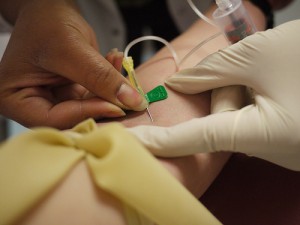If you suffer from long-lasting fatigue, memory problems, or pins and needles sensations, then you should test for vitamin B12 deficiency right away. Tests for vitamin B12 deficiency or pernicious anemia include cobalamin level screenings, as well as tests to determine your ability to absorb vitamin B12 from food. For an accurate diagnosis, it’s a good idea to take advantage of as many tests as your doctor can offer.
How much vitamin B12 do you need?
While not all doctors or scientists agree as to what constitutes a healthy serum level of vitamin B12, the most widely accepted value is 200 picograms per milliliter (pg/mL).
Vitamin B12 Deficiency: The Invisible Epidemic!
Serum Cobalamin (Vitamin B12) Test
If you think you have vitamin B12 deficiency, then the first course of action will be to order a serum cobalamin test to see how much vitamin B12 is in your blood supply. This blood test will check for low vitamin B12 levels even in people who don’t have pernicious anemia or symptoms of vitamin B12 deficiency. But it is not foolproof- a false normal test result can occur, especially in people who have liver disorders, renal insufficiency, or bone marrow disease.
Complete blood count (CBC)
A CBC is sometimes used to diagnose anemia, including vitamin B12 deficiency. If you’re suffering from extreme fatigue, unexplained bruising, or dizziness, then your doctor may order a complete blood count to count red blood cells, white blood cells, and platelets. However, a positive test result does not rule out vitamin B12 deficiency.
Methylmalonic Acid Tes
Another helpful tool for accurately testing for vitamin B12 deficiency is the Methylmalonic acid (MMA) test, as MMA levels increase dramatically with vitamin B12 deficiency.
This is an expensive test, so it’s not commonly used for detecting vitamin B12 deficiency. In 2006, an MMA test for vitamin B12 deficiency without insurance could cost over $200.00
Intrinsic Factor Blocking Antibody (IFAB) Test
Sometimes, pernicious anemia from vitamin B12 deficiency occurs because of an autoimmune condition that destroys intrinsic factor, a digestive enzyme crucial for vitamin B12 absorption.
A positive IFAB test result means that you have antibodies to intrinsic factor, resulting in the inability to digest vitamin B12 naturally from foods such as meat, fish, poultry, dairy, and egg products.
Schilling Test
Though not available in the US, the Schilling test is considered an effective method for diagnosing vitamin B12 malabsorption. Rather than checking for vitamin B12 levels in the blood, the Schilling test gauges your ability to absorb crystalline vitamin B12. However, a normal test result does not rule out vitamin B12 deficiency.
Symptoms of Vitamin B12 Deficiency
A thorough physical examination and review of your medical history will help your doctor determine if you have vitamin B12 deficiency.
But since no tests for vitamin B12 deficiency are 100% accurate, it’s important to recognize the classic symptoms of vitamin B12 deficiency, so that you can help your physician make an informed decision.
Symptoms of vitamin B12 deficiency include:
- Long-lasting fatigue
- Difficulty concentrating
- Agitation
- Anxiety
- Depression
- Memory problems
- Painful numbness or tingling in the hands and feet
- Sore tongue
- Burning, itching sensations
- Muscle spasms
- Headaches
- Tinnitus (ear ringing)
- Difficulty walking in a straight line
Please tell us…
Which tests for vitamin B12 deficiency have you taken, besides the B12 blood test?
Do you have any questions or suggestions? Please leave your comments below.
Share with your friends!
If you found this article helpful, then please share with your friends, family, and coworkers by email, twitter, or Facebook.
Like this? Read more:
Is Pernicious Anemia Megaloblastic?
What are the Symptoms of Pernicious Anemia- B12 deficiency?
Image courtesy of Thirteen Of Clubs/flickr


